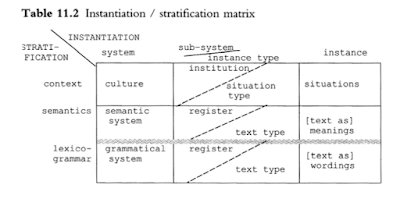So cutting across genres then, we have the question of the role language is playing, i.e. mode. And we can explore the effect of technologies of communication on texture with respect to two clines: degrees of abstraction (action/reflection) and degrees of interactivity (monologue/dialogue). This is an area that needs a lot more research, but there are hints of progress in Halliday and Martin (1993), Martin and Veel (1998), Martin (2001a) and Christie (2002).
Blogger Comments:
[1] To be clear, in SFL Theory, mode is a system of the cultural context. However, Martin & Rose misunderstand context as register, and so misconstrue mode as a system of register.
Adding to the confusion, as previously explained, the SFL notion of mode, the rôle language is playing, corresponds to the authors' notion of the purpose of a genre. So by construing mode as a system of register, instead of genre, Martin & Rose are inconsistent even in terms of their own modelling.
To be clear, in SFL Theory, register is a sub-potential of language, not a system of context, and 'genre', in the sense of text type, is register viewed from the instance pole of the cline of instantiation.
[3] To be clear, 'language in action' and 'language in reflection' do not differ in terms of abstraction. Both are construed as the same level of abstraction, but are opposite poles on a cline representing the degree to which discourse contributes to the total activity.

No comments:
Post a Comment